LSBM104: Comprehensive Report on Australian Accounting Standards Board
VerifiedAdded on 2023/01/19
|8
|2430
|63
Report
AI Summary
This report provides an analysis of the Australian Accounting Standards Board, exploring the ethical dimensions of accounting practices and the importance of adhering to the code of ethics, encompassing principles like integrity, objectivity, confidentiality, competence, and professional behavior. It contrasts rule-based and principle-based accounting, examining their implications for corporate governance and the challenges accountants face. The report delves into the role of the IASB in developing International Financial Reporting Standards (IFRS) and the benefits of a single set of accounting standards, such as improved transparency, accountability, and economic efficiency. The conclusion emphasizes the significance of global standards in facilitating informed decision-making and the crucial role of accountants in ensuring accurate and ethical financial reporting, in line with the LSBM104 module requirements.
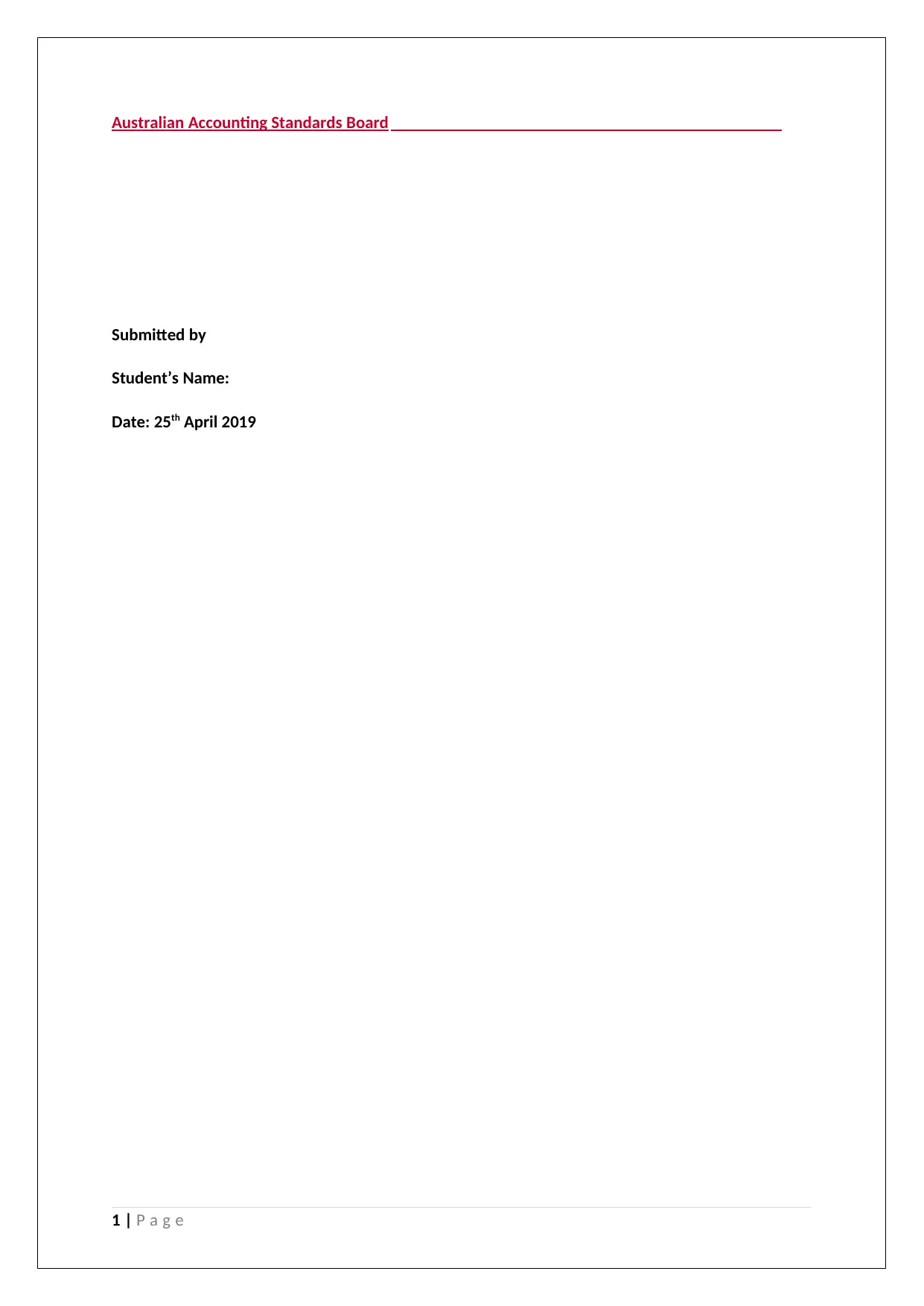
Australian Accounting Standards Board
Submitted by
Student’s Name:
Date: 25th April 2019
1 | P a g e
Submitted by
Student’s Name:
Date: 25th April 2019
1 | P a g e
Paraphrase This Document
Need a fresh take? Get an instant paraphrase of this document with our AI Paraphraser
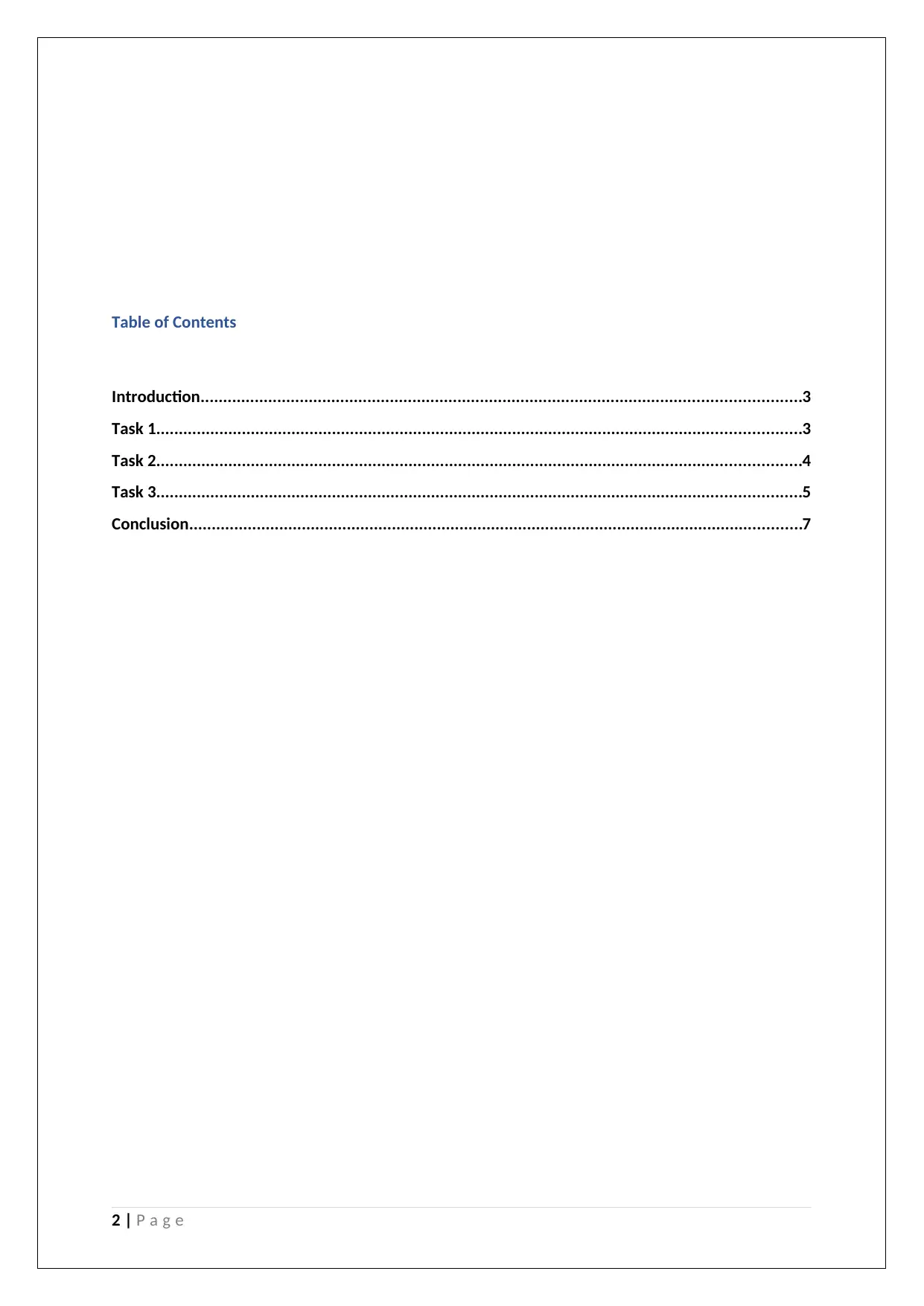
Table of Contents
Introduction.....................................................................................................................................3
Task 1...............................................................................................................................................3
Task 2...............................................................................................................................................4
Task 3...............................................................................................................................................5
Conclusion........................................................................................................................................7
2 | P a g e
Introduction.....................................................................................................................................3
Task 1...............................................................................................................................................3
Task 2...............................................................................................................................................4
Task 3...............................................................................................................................................5
Conclusion........................................................................................................................................7
2 | P a g e
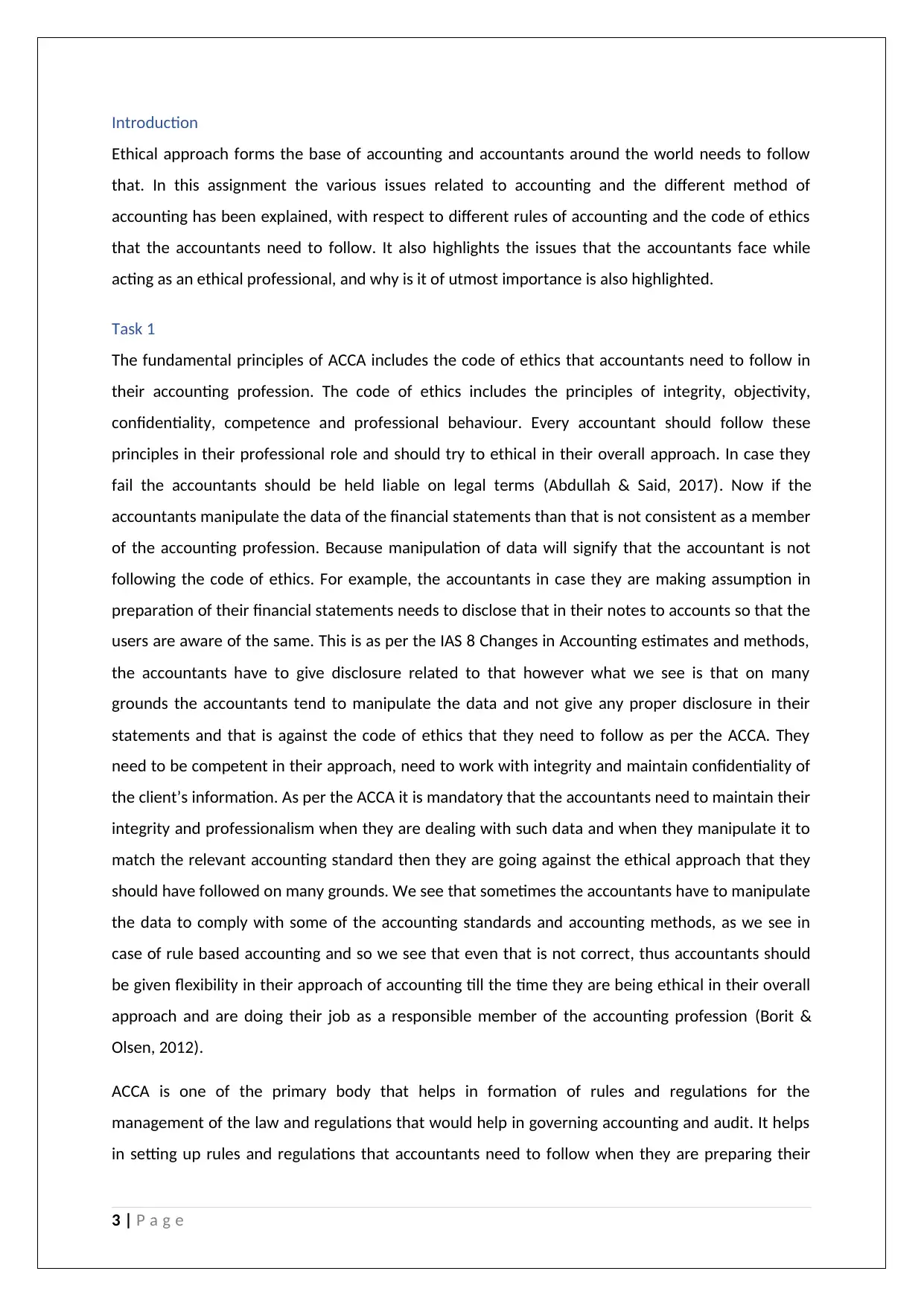
Introduction
Ethical approach forms the base of accounting and accountants around the world needs to follow
that. In this assignment the various issues related to accounting and the different method of
accounting has been explained, with respect to different rules of accounting and the code of ethics
that the accountants need to follow. It also highlights the issues that the accountants face while
acting as an ethical professional, and why is it of utmost importance is also highlighted.
Task 1
The fundamental principles of ACCA includes the code of ethics that accountants need to follow in
their accounting profession. The code of ethics includes the principles of integrity, objectivity,
confidentiality, competence and professional behaviour. Every accountant should follow these
principles in their professional role and should try to ethical in their overall approach. In case they
fail the accountants should be held liable on legal terms (Abdullah & Said, 2017). Now if the
accountants manipulate the data of the financial statements than that is not consistent as a member
of the accounting profession. Because manipulation of data will signify that the accountant is not
following the code of ethics. For example, the accountants in case they are making assumption in
preparation of their financial statements needs to disclose that in their notes to accounts so that the
users are aware of the same. This is as per the IAS 8 Changes in Accounting estimates and methods,
the accountants have to give disclosure related to that however what we see is that on many
grounds the accountants tend to manipulate the data and not give any proper disclosure in their
statements and that is against the code of ethics that they need to follow as per the ACCA. They
need to be competent in their approach, need to work with integrity and maintain confidentiality of
the client’s information. As per the ACCA it is mandatory that the accountants need to maintain their
integrity and professionalism when they are dealing with such data and when they manipulate it to
match the relevant accounting standard then they are going against the ethical approach that they
should have followed on many grounds. We see that sometimes the accountants have to manipulate
the data to comply with some of the accounting standards and accounting methods, as we see in
case of rule based accounting and so we see that even that is not correct, thus accountants should
be given flexibility in their approach of accounting till the time they are being ethical in their overall
approach and are doing their job as a responsible member of the accounting profession (Borit &
Olsen, 2012).
ACCA is one of the primary body that helps in formation of rules and regulations for the
management of the law and regulations that would help in governing accounting and audit. It helps
in setting up rules and regulations that accountants need to follow when they are preparing their
3 | P a g e
Ethical approach forms the base of accounting and accountants around the world needs to follow
that. In this assignment the various issues related to accounting and the different method of
accounting has been explained, with respect to different rules of accounting and the code of ethics
that the accountants need to follow. It also highlights the issues that the accountants face while
acting as an ethical professional, and why is it of utmost importance is also highlighted.
Task 1
The fundamental principles of ACCA includes the code of ethics that accountants need to follow in
their accounting profession. The code of ethics includes the principles of integrity, objectivity,
confidentiality, competence and professional behaviour. Every accountant should follow these
principles in their professional role and should try to ethical in their overall approach. In case they
fail the accountants should be held liable on legal terms (Abdullah & Said, 2017). Now if the
accountants manipulate the data of the financial statements than that is not consistent as a member
of the accounting profession. Because manipulation of data will signify that the accountant is not
following the code of ethics. For example, the accountants in case they are making assumption in
preparation of their financial statements needs to disclose that in their notes to accounts so that the
users are aware of the same. This is as per the IAS 8 Changes in Accounting estimates and methods,
the accountants have to give disclosure related to that however what we see is that on many
grounds the accountants tend to manipulate the data and not give any proper disclosure in their
statements and that is against the code of ethics that they need to follow as per the ACCA. They
need to be competent in their approach, need to work with integrity and maintain confidentiality of
the client’s information. As per the ACCA it is mandatory that the accountants need to maintain their
integrity and professionalism when they are dealing with such data and when they manipulate it to
match the relevant accounting standard then they are going against the ethical approach that they
should have followed on many grounds. We see that sometimes the accountants have to manipulate
the data to comply with some of the accounting standards and accounting methods, as we see in
case of rule based accounting and so we see that even that is not correct, thus accountants should
be given flexibility in their approach of accounting till the time they are being ethical in their overall
approach and are doing their job as a responsible member of the accounting profession (Borit &
Olsen, 2012).
ACCA is one of the primary body that helps in formation of rules and regulations for the
management of the law and regulations that would help in governing accounting and audit. It helps
in setting up rules and regulations that accountants need to follow when they are preparing their
3 | P a g e
⊘ This is a preview!⊘
Do you want full access?
Subscribe today to unlock all pages.

Trusted by 1+ million students worldwide
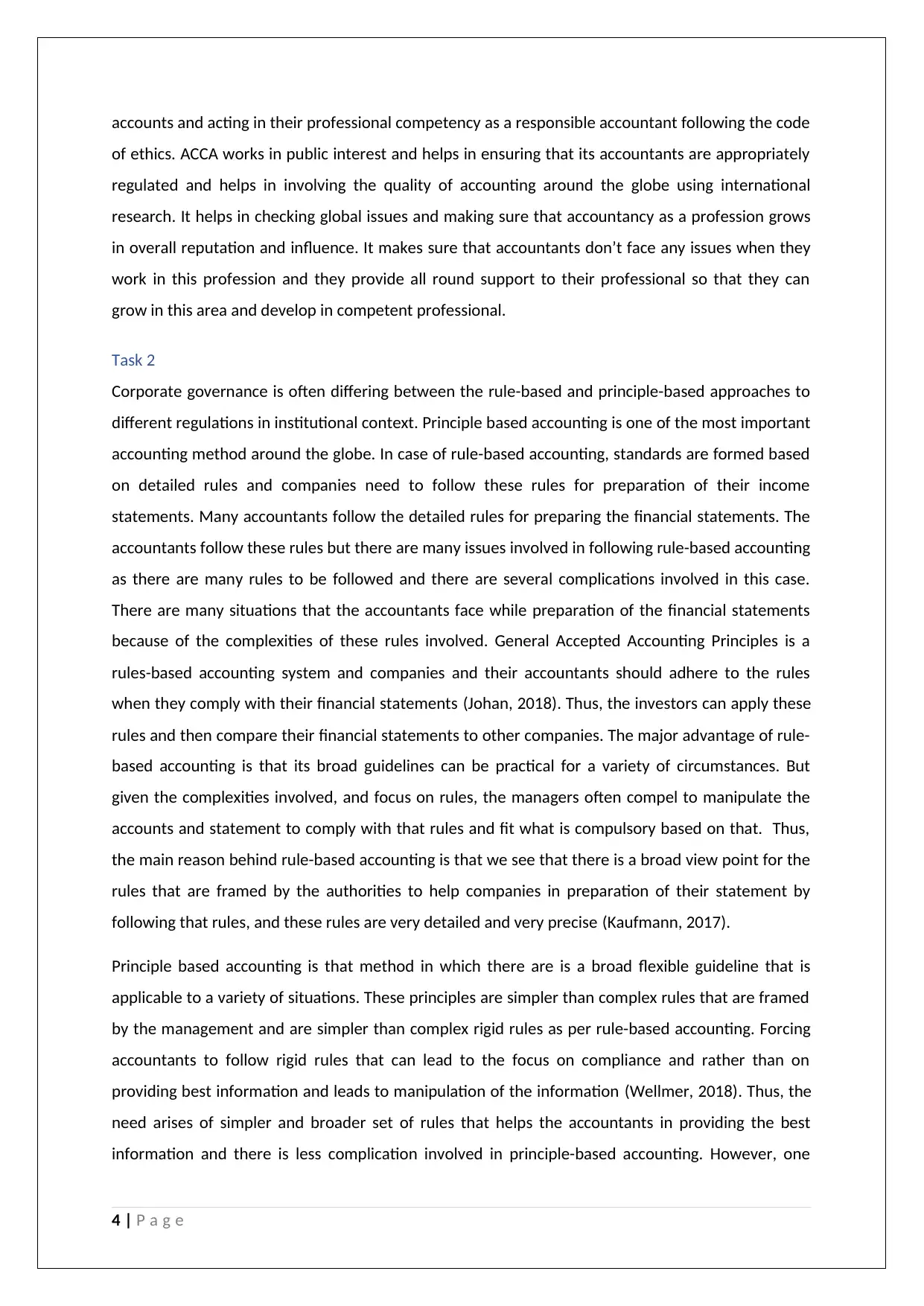
accounts and acting in their professional competency as a responsible accountant following the code
of ethics. ACCA works in public interest and helps in ensuring that its accountants are appropriately
regulated and helps in involving the quality of accounting around the globe using international
research. It helps in checking global issues and making sure that accountancy as a profession grows
in overall reputation and influence. It makes sure that accountants don’t face any issues when they
work in this profession and they provide all round support to their professional so that they can
grow in this area and develop in competent professional.
Task 2
Corporate governance is often differing between the rule-based and principle-based approaches to
different regulations in institutional context. Principle based accounting is one of the most important
accounting method around the globe. In case of rule-based accounting, standards are formed based
on detailed rules and companies need to follow these rules for preparation of their income
statements. Many accountants follow the detailed rules for preparing the financial statements. The
accountants follow these rules but there are many issues involved in following rule-based accounting
as there are many rules to be followed and there are several complications involved in this case.
There are many situations that the accountants face while preparation of the financial statements
because of the complexities of these rules involved. General Accepted Accounting Principles is a
rules-based accounting system and companies and their accountants should adhere to the rules
when they comply with their financial statements (Johan, 2018). Thus, the investors can apply these
rules and then compare their financial statements to other companies. The major advantage of rule-
based accounting is that its broad guidelines can be practical for a variety of circumstances. But
given the complexities involved, and focus on rules, the managers often compel to manipulate the
accounts and statement to comply with that rules and fit what is compulsory based on that. Thus,
the main reason behind rule-based accounting is that we see that there is a broad view point for the
rules that are framed by the authorities to help companies in preparation of their statement by
following that rules, and these rules are very detailed and very precise (Kaufmann, 2017).
Principle based accounting is that method in which there are is a broad flexible guideline that is
applicable to a variety of situations. These principles are simpler than complex rules that are framed
by the management and are simpler than complex rigid rules as per rule-based accounting. Forcing
accountants to follow rigid rules that can lead to the focus on compliance and rather than on
providing best information and leads to manipulation of the information (Wellmer, 2018). Thus, the
need arises of simpler and broader set of rules that helps the accountants in providing the best
information and there is less complication involved in principle-based accounting. However, one
4 | P a g e
of ethics. ACCA works in public interest and helps in ensuring that its accountants are appropriately
regulated and helps in involving the quality of accounting around the globe using international
research. It helps in checking global issues and making sure that accountancy as a profession grows
in overall reputation and influence. It makes sure that accountants don’t face any issues when they
work in this profession and they provide all round support to their professional so that they can
grow in this area and develop in competent professional.
Task 2
Corporate governance is often differing between the rule-based and principle-based approaches to
different regulations in institutional context. Principle based accounting is one of the most important
accounting method around the globe. In case of rule-based accounting, standards are formed based
on detailed rules and companies need to follow these rules for preparation of their income
statements. Many accountants follow the detailed rules for preparing the financial statements. The
accountants follow these rules but there are many issues involved in following rule-based accounting
as there are many rules to be followed and there are several complications involved in this case.
There are many situations that the accountants face while preparation of the financial statements
because of the complexities of these rules involved. General Accepted Accounting Principles is a
rules-based accounting system and companies and their accountants should adhere to the rules
when they comply with their financial statements (Johan, 2018). Thus, the investors can apply these
rules and then compare their financial statements to other companies. The major advantage of rule-
based accounting is that its broad guidelines can be practical for a variety of circumstances. But
given the complexities involved, and focus on rules, the managers often compel to manipulate the
accounts and statement to comply with that rules and fit what is compulsory based on that. Thus,
the main reason behind rule-based accounting is that we see that there is a broad view point for the
rules that are framed by the authorities to help companies in preparation of their statement by
following that rules, and these rules are very detailed and very precise (Kaufmann, 2017).
Principle based accounting is that method in which there are is a broad flexible guideline that is
applicable to a variety of situations. These principles are simpler than complex rules that are framed
by the management and are simpler than complex rigid rules as per rule-based accounting. Forcing
accountants to follow rigid rules that can lead to the focus on compliance and rather than on
providing best information and leads to manipulation of the information (Wellmer, 2018). Thus, the
need arises of simpler and broader set of rules that helps the accountants in providing the best
information and there is less complication involved in principle-based accounting. However, one
4 | P a g e
Paraphrase This Document
Need a fresh take? Get an instant paraphrase of this document with our AI Paraphraser
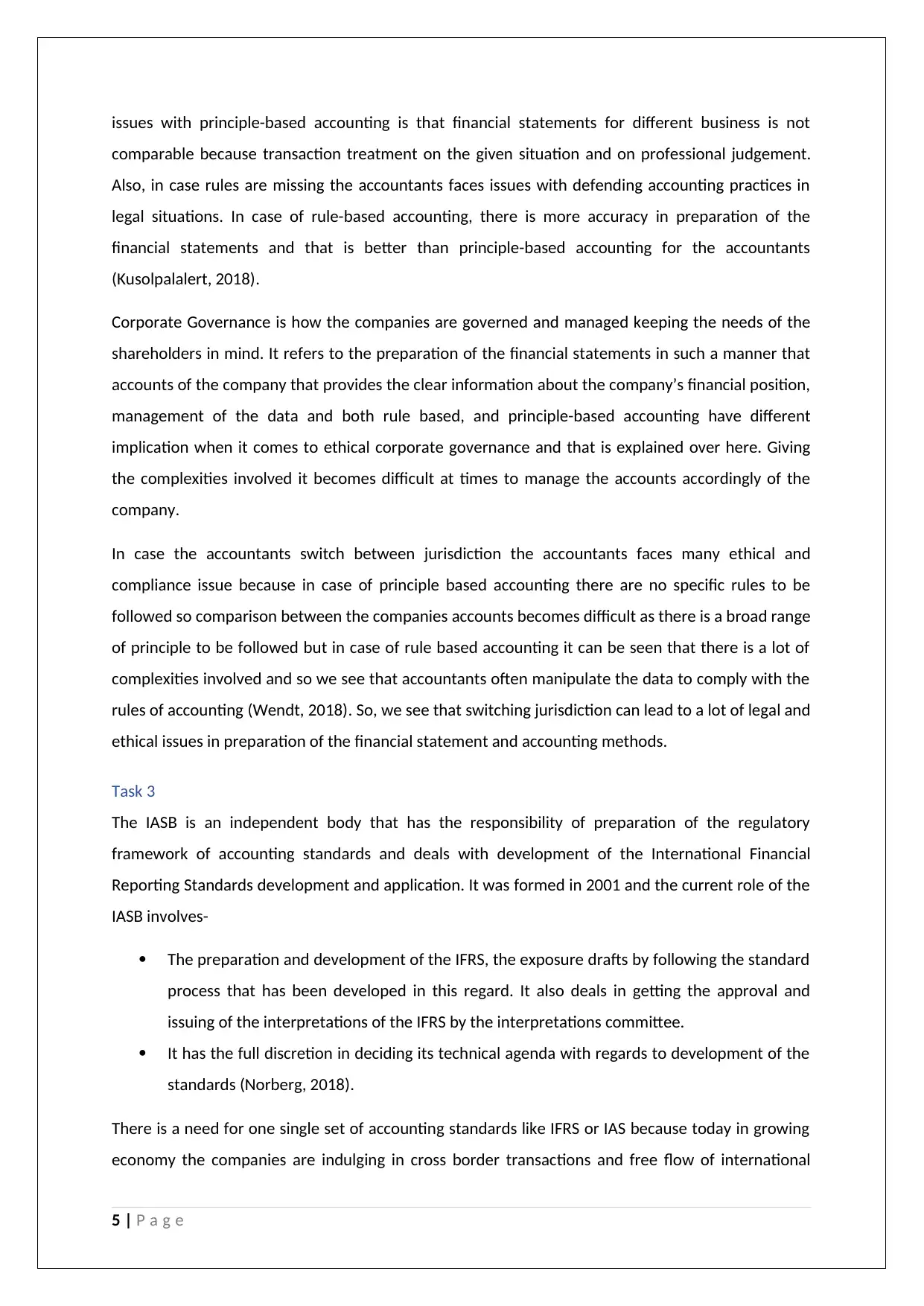
issues with principle-based accounting is that financial statements for different business is not
comparable because transaction treatment on the given situation and on professional judgement.
Also, in case rules are missing the accountants faces issues with defending accounting practices in
legal situations. In case of rule-based accounting, there is more accuracy in preparation of the
financial statements and that is better than principle-based accounting for the accountants
(Kusolpalalert, 2018).
Corporate Governance is how the companies are governed and managed keeping the needs of the
shareholders in mind. It refers to the preparation of the financial statements in such a manner that
accounts of the company that provides the clear information about the company’s financial position,
management of the data and both rule based, and principle-based accounting have different
implication when it comes to ethical corporate governance and that is explained over here. Giving
the complexities involved it becomes difficult at times to manage the accounts accordingly of the
company.
In case the accountants switch between jurisdiction the accountants faces many ethical and
compliance issue because in case of principle based accounting there are no specific rules to be
followed so comparison between the companies accounts becomes difficult as there is a broad range
of principle to be followed but in case of rule based accounting it can be seen that there is a lot of
complexities involved and so we see that accountants often manipulate the data to comply with the
rules of accounting (Wendt, 2018). So, we see that switching jurisdiction can lead to a lot of legal and
ethical issues in preparation of the financial statement and accounting methods.
Task 3
The IASB is an independent body that has the responsibility of preparation of the regulatory
framework of accounting standards and deals with development of the International Financial
Reporting Standards development and application. It was formed in 2001 and the current role of the
IASB involves-
The preparation and development of the IFRS, the exposure drafts by following the standard
process that has been developed in this regard. It also deals in getting the approval and
issuing of the interpretations of the IFRS by the interpretations committee.
It has the full discretion in deciding its technical agenda with regards to development of the
standards (Norberg, 2018).
There is a need for one single set of accounting standards like IFRS or IAS because today in growing
economy the companies are indulging in cross border transactions and free flow of international
5 | P a g e
comparable because transaction treatment on the given situation and on professional judgement.
Also, in case rules are missing the accountants faces issues with defending accounting practices in
legal situations. In case of rule-based accounting, there is more accuracy in preparation of the
financial statements and that is better than principle-based accounting for the accountants
(Kusolpalalert, 2018).
Corporate Governance is how the companies are governed and managed keeping the needs of the
shareholders in mind. It refers to the preparation of the financial statements in such a manner that
accounts of the company that provides the clear information about the company’s financial position,
management of the data and both rule based, and principle-based accounting have different
implication when it comes to ethical corporate governance and that is explained over here. Giving
the complexities involved it becomes difficult at times to manage the accounts accordingly of the
company.
In case the accountants switch between jurisdiction the accountants faces many ethical and
compliance issue because in case of principle based accounting there are no specific rules to be
followed so comparison between the companies accounts becomes difficult as there is a broad range
of principle to be followed but in case of rule based accounting it can be seen that there is a lot of
complexities involved and so we see that accountants often manipulate the data to comply with the
rules of accounting (Wendt, 2018). So, we see that switching jurisdiction can lead to a lot of legal and
ethical issues in preparation of the financial statement and accounting methods.
Task 3
The IASB is an independent body that has the responsibility of preparation of the regulatory
framework of accounting standards and deals with development of the International Financial
Reporting Standards development and application. It was formed in 2001 and the current role of the
IASB involves-
The preparation and development of the IFRS, the exposure drafts by following the standard
process that has been developed in this regard. It also deals in getting the approval and
issuing of the interpretations of the IFRS by the interpretations committee.
It has the full discretion in deciding its technical agenda with regards to development of the
standards (Norberg, 2018).
There is a need for one single set of accounting standards like IFRS or IAS because today in growing
economy the companies are indulging in cross border transactions and free flow of international
5 | P a g e
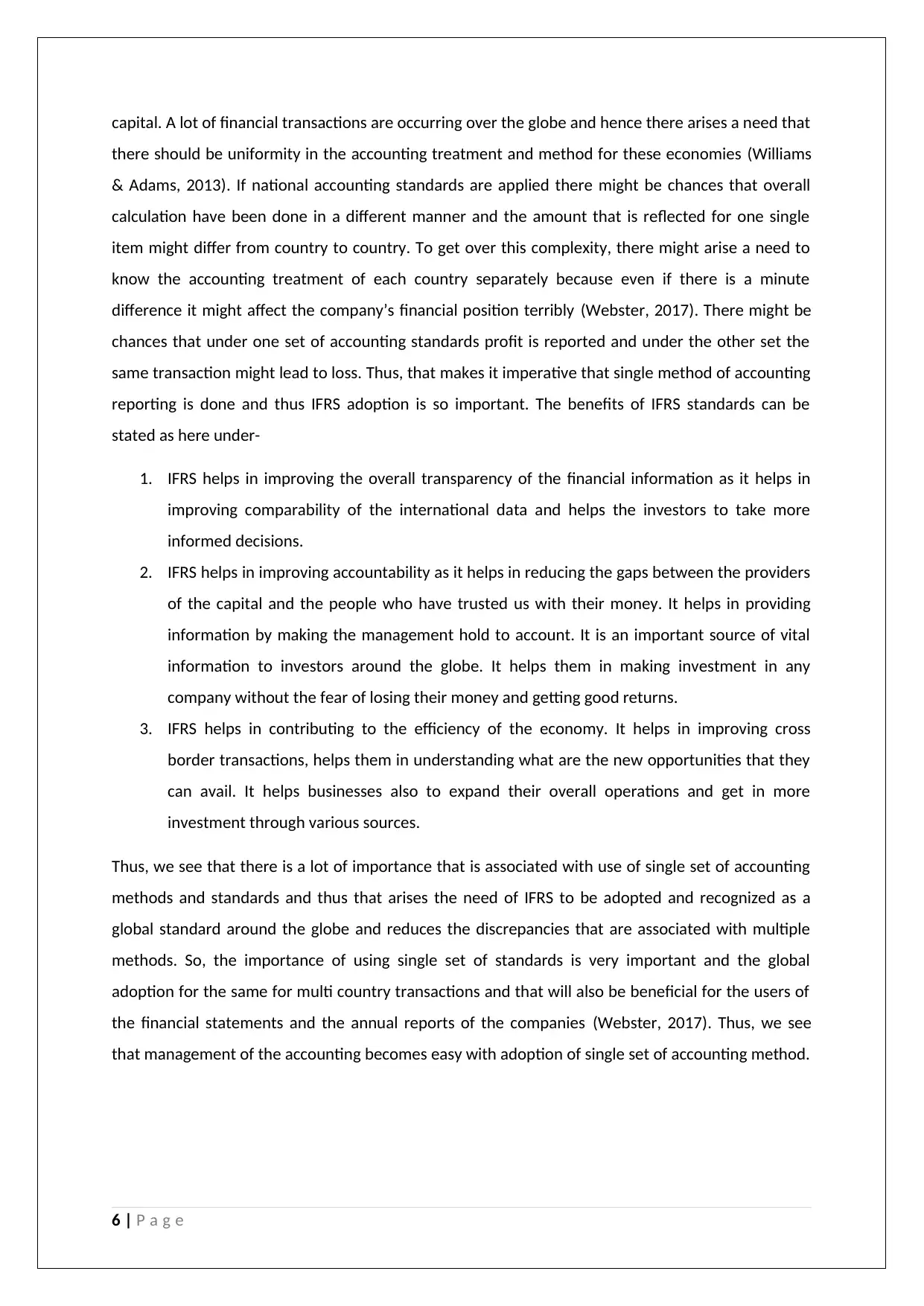
capital. A lot of financial transactions are occurring over the globe and hence there arises a need that
there should be uniformity in the accounting treatment and method for these economies (Williams
& Adams, 2013). If national accounting standards are applied there might be chances that overall
calculation have been done in a different manner and the amount that is reflected for one single
item might differ from country to country. To get over this complexity, there might arise a need to
know the accounting treatment of each country separately because even if there is a minute
difference it might affect the company’s financial position terribly (Webster, 2017). There might be
chances that under one set of accounting standards profit is reported and under the other set the
same transaction might lead to loss. Thus, that makes it imperative that single method of accounting
reporting is done and thus IFRS adoption is so important. The benefits of IFRS standards can be
stated as here under-
1. IFRS helps in improving the overall transparency of the financial information as it helps in
improving comparability of the international data and helps the investors to take more
informed decisions.
2. IFRS helps in improving accountability as it helps in reducing the gaps between the providers
of the capital and the people who have trusted us with their money. It helps in providing
information by making the management hold to account. It is an important source of vital
information to investors around the globe. It helps them in making investment in any
company without the fear of losing their money and getting good returns.
3. IFRS helps in contributing to the efficiency of the economy. It helps in improving cross
border transactions, helps them in understanding what are the new opportunities that they
can avail. It helps businesses also to expand their overall operations and get in more
investment through various sources.
Thus, we see that there is a lot of importance that is associated with use of single set of accounting
methods and standards and thus that arises the need of IFRS to be adopted and recognized as a
global standard around the globe and reduces the discrepancies that are associated with multiple
methods. So, the importance of using single set of standards is very important and the global
adoption for the same for multi country transactions and that will also be beneficial for the users of
the financial statements and the annual reports of the companies (Webster, 2017). Thus, we see
that management of the accounting becomes easy with adoption of single set of accounting method.
6 | P a g e
there should be uniformity in the accounting treatment and method for these economies (Williams
& Adams, 2013). If national accounting standards are applied there might be chances that overall
calculation have been done in a different manner and the amount that is reflected for one single
item might differ from country to country. To get over this complexity, there might arise a need to
know the accounting treatment of each country separately because even if there is a minute
difference it might affect the company’s financial position terribly (Webster, 2017). There might be
chances that under one set of accounting standards profit is reported and under the other set the
same transaction might lead to loss. Thus, that makes it imperative that single method of accounting
reporting is done and thus IFRS adoption is so important. The benefits of IFRS standards can be
stated as here under-
1. IFRS helps in improving the overall transparency of the financial information as it helps in
improving comparability of the international data and helps the investors to take more
informed decisions.
2. IFRS helps in improving accountability as it helps in reducing the gaps between the providers
of the capital and the people who have trusted us with their money. It helps in providing
information by making the management hold to account. It is an important source of vital
information to investors around the globe. It helps them in making investment in any
company without the fear of losing their money and getting good returns.
3. IFRS helps in contributing to the efficiency of the economy. It helps in improving cross
border transactions, helps them in understanding what are the new opportunities that they
can avail. It helps businesses also to expand their overall operations and get in more
investment through various sources.
Thus, we see that there is a lot of importance that is associated with use of single set of accounting
methods and standards and thus that arises the need of IFRS to be adopted and recognized as a
global standard around the globe and reduces the discrepancies that are associated with multiple
methods. So, the importance of using single set of standards is very important and the global
adoption for the same for multi country transactions and that will also be beneficial for the users of
the financial statements and the annual reports of the companies (Webster, 2017). Thus, we see
that management of the accounting becomes easy with adoption of single set of accounting method.
6 | P a g e
⊘ This is a preview!⊘
Do you want full access?
Subscribe today to unlock all pages.

Trusted by 1+ million students worldwide
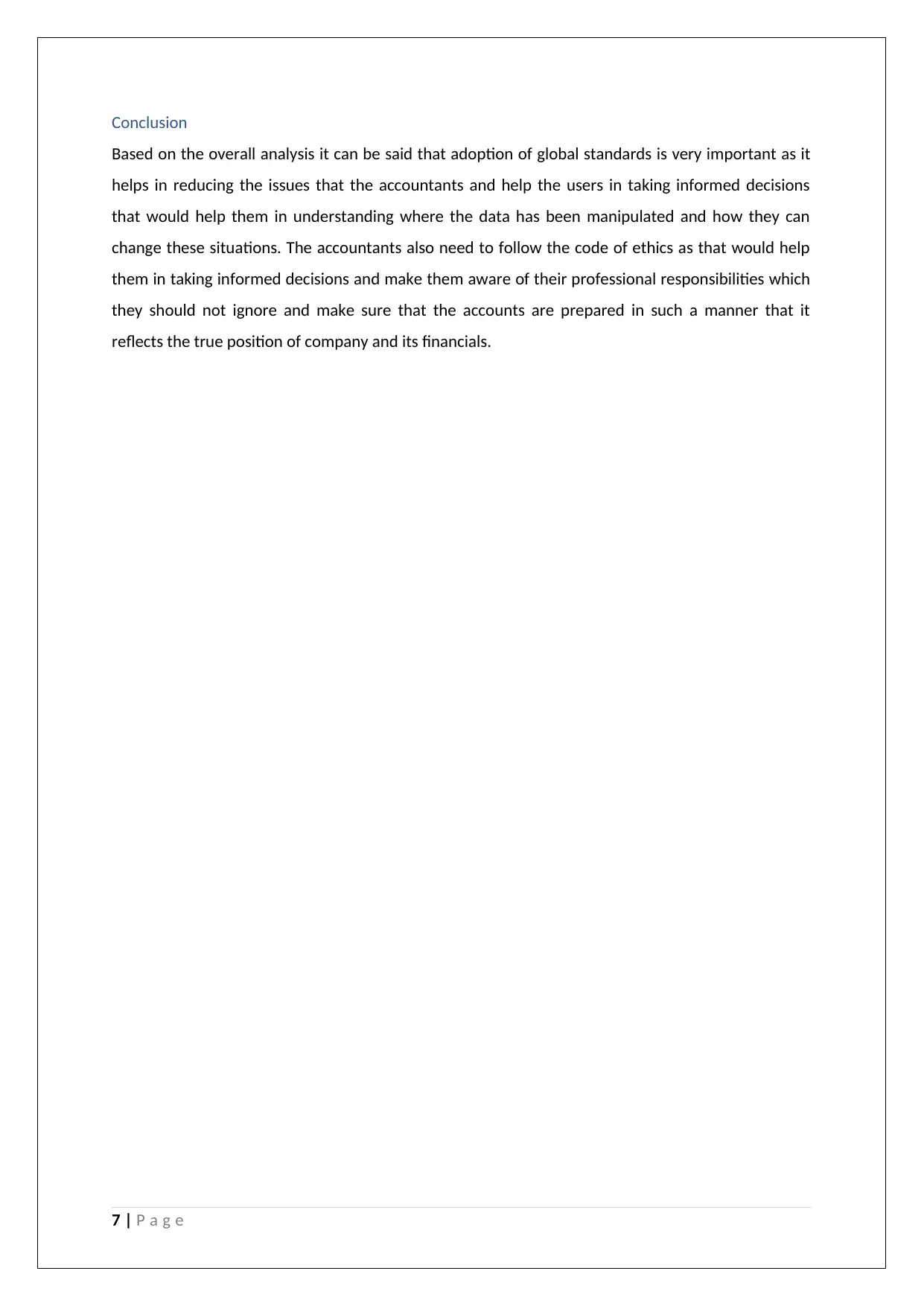
Conclusion
Based on the overall analysis it can be said that adoption of global standards is very important as it
helps in reducing the issues that the accountants and help the users in taking informed decisions
that would help them in understanding where the data has been manipulated and how they can
change these situations. The accountants also need to follow the code of ethics as that would help
them in taking informed decisions and make them aware of their professional responsibilities which
they should not ignore and make sure that the accounts are prepared in such a manner that it
reflects the true position of company and its financials.
7 | P a g e
Based on the overall analysis it can be said that adoption of global standards is very important as it
helps in reducing the issues that the accountants and help the users in taking informed decisions
that would help them in understanding where the data has been manipulated and how they can
change these situations. The accountants also need to follow the code of ethics as that would help
them in taking informed decisions and make them aware of their professional responsibilities which
they should not ignore and make sure that the accounts are prepared in such a manner that it
reflects the true position of company and its financials.
7 | P a g e
Paraphrase This Document
Need a fresh take? Get an instant paraphrase of this document with our AI Paraphraser
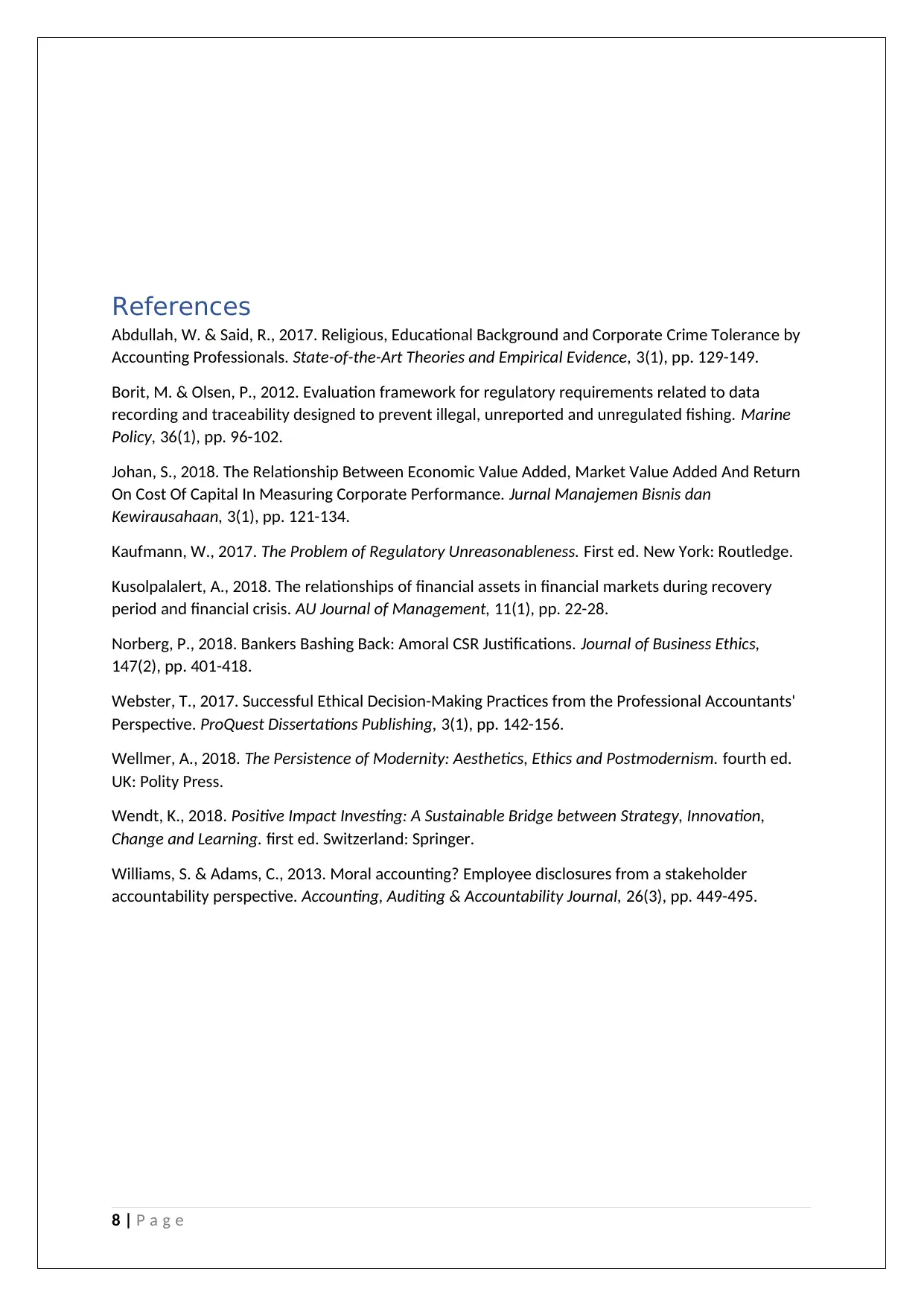
References
Abdullah, W. & Said, R., 2017. Religious, Educational Background and Corporate Crime Tolerance by
Accounting Professionals. State-of-the-Art Theories and Empirical Evidence, 3(1), pp. 129-149.
Borit, M. & Olsen, P., 2012. Evaluation framework for regulatory requirements related to data
recording and traceability designed to prevent illegal, unreported and unregulated fishing. Marine
Policy, 36(1), pp. 96-102.
Johan, S., 2018. The Relationship Between Economic Value Added, Market Value Added And Return
On Cost Of Capital In Measuring Corporate Performance. Jurnal Manajemen Bisnis dan
Kewirausahaan, 3(1), pp. 121-134.
Kaufmann, W., 2017. The Problem of Regulatory Unreasonableness. First ed. New York: Routledge.
Kusolpalalert, A., 2018. The relationships of financial assets in financial markets during recovery
period and financial crisis. AU Journal of Management, 11(1), pp. 22-28.
Norberg, P., 2018. Bankers Bashing Back: Amoral CSR Justifications. Journal of Business Ethics,
147(2), pp. 401-418.
Webster, T., 2017. Successful Ethical Decision-Making Practices from the Professional Accountants'
Perspective. ProQuest Dissertations Publishing, 3(1), pp. 142-156.
Wellmer, A., 2018. The Persistence of Modernity: Aesthetics, Ethics and Postmodernism. fourth ed.
UK: Polity Press.
Wendt, K., 2018. Positive Impact Investing: A Sustainable Bridge between Strategy, Innovation,
Change and Learning. first ed. Switzerland: Springer.
Williams, S. & Adams, C., 2013. Moral accounting? Employee disclosures from a stakeholder
accountability perspective. Accounting, Auditing & Accountability Journal, 26(3), pp. 449-495.
8 | P a g e
Abdullah, W. & Said, R., 2017. Religious, Educational Background and Corporate Crime Tolerance by
Accounting Professionals. State-of-the-Art Theories and Empirical Evidence, 3(1), pp. 129-149.
Borit, M. & Olsen, P., 2012. Evaluation framework for regulatory requirements related to data
recording and traceability designed to prevent illegal, unreported and unregulated fishing. Marine
Policy, 36(1), pp. 96-102.
Johan, S., 2018. The Relationship Between Economic Value Added, Market Value Added And Return
On Cost Of Capital In Measuring Corporate Performance. Jurnal Manajemen Bisnis dan
Kewirausahaan, 3(1), pp. 121-134.
Kaufmann, W., 2017. The Problem of Regulatory Unreasonableness. First ed. New York: Routledge.
Kusolpalalert, A., 2018. The relationships of financial assets in financial markets during recovery
period and financial crisis. AU Journal of Management, 11(1), pp. 22-28.
Norberg, P., 2018. Bankers Bashing Back: Amoral CSR Justifications. Journal of Business Ethics,
147(2), pp. 401-418.
Webster, T., 2017. Successful Ethical Decision-Making Practices from the Professional Accountants'
Perspective. ProQuest Dissertations Publishing, 3(1), pp. 142-156.
Wellmer, A., 2018. The Persistence of Modernity: Aesthetics, Ethics and Postmodernism. fourth ed.
UK: Polity Press.
Wendt, K., 2018. Positive Impact Investing: A Sustainable Bridge between Strategy, Innovation,
Change and Learning. first ed. Switzerland: Springer.
Williams, S. & Adams, C., 2013. Moral accounting? Employee disclosures from a stakeholder
accountability perspective. Accounting, Auditing & Accountability Journal, 26(3), pp. 449-495.
8 | P a g e
1 out of 8
Related Documents
Your All-in-One AI-Powered Toolkit for Academic Success.
+13062052269
info@desklib.com
Available 24*7 on WhatsApp / Email
![[object Object]](/_next/static/media/star-bottom.7253800d.svg)
Unlock your academic potential
Copyright © 2020–2025 A2Z Services. All Rights Reserved. Developed and managed by ZUCOL.





